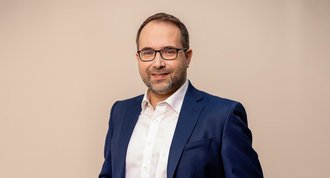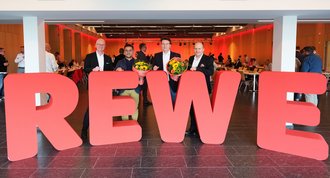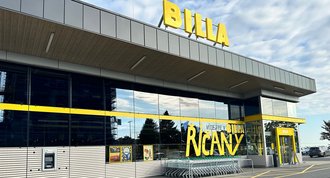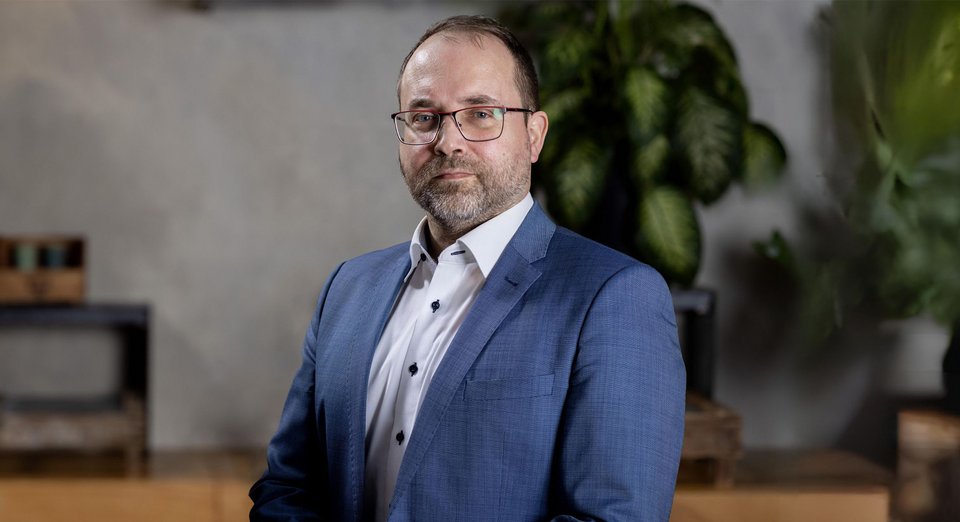
Despite persistently difficult conditions, we were once again able to close the business year on a stable and successful note thanks to our broad international positioning in Retail and Tourism. We spoke to CFO Telerik Shishmanov about how REWE Group has positioned itself for the challenges of the coming years.
one: Mr Shishmanov, the 2023 financial year was characterised by a number of challenges for trade - how would you sum it up?
Telerik Shishmanov: The political and geopolitical situation has kept us very busy - in particular the ongoing war of aggression against Ukraine and the atrocities committed by Hamas against the Israeli people, as well as the associated reactions in the Middle East conflict. All of this has an impact on the supply of goods and raw materials, on supply chains and ultimately also on customers' consumer behaviour.
As in 2022, high inflation accompanied us again last year, particularly in the food sector. It only fell significantly towards the end of last year, meaning that we can currently speak of deflation in the food sector in most of our countries. This means that we are moving from hyperinflation to deflation, combined with ongoing uncertainties. At the same time, costs are rising. We are now seeing price increases - partly as a result of the electricity and gas crisis - in raw material costs, product costs and, last but not least, personnel costs. We have a situation where both the deflationary trends and the cost situation are taking full effect. We have to react to this discrepancy with appropriate measures: falling food prices with rising labour and material costs. We have to be prepared for this. Especially in negotiations with suppliers, some of whom have benefited from inflation in recent years.
one: Affordable prices for all our customers were a top priority in the past financial year. We also invested in prices for this in 2023. How much longer do you think this will be necessary?
Telerik Shishmanov: We will have to take a long-term view to see how revenue, deflationary trends and the cost base develop. One thing is clear: we must continue to invest in order to secure the future, but we must carefully consider which cost items we want and need to continue to afford in the future. We can only spend the same euro once. Under these conditions, we will have to prioritise differently and be even more consistent in our use of money.
one: Despite the challenges, REWE Group had a good economic development in 2023.
Telerik Shishmanov: Yes, last year was the best in the company's history despite the crises. It is very positive that we have remained stable in these difficult times - this once again shows the strength of our cooperative. But we are still not in a position to generate the investments we need to be equipped for the future. Every year so far, we have to take on between 200 and 400 million euros in new debt - and at a different interest rate than in the past. Just two years ago, we could expect interest rates of less than one per cent. In contrast, we issued our sustainability-linked bond in 2023 at an interest rate of 4.9 per cent. That's a big difference.
one: What exactly does this mean for our investments in the coming years?
Telerik Shishmanov: We must not rest on our laurels. We must continue to be vigilant, as the sales development of the last two years was heavily influenced by inflation and the slump in tourism during the coronavirus period and the subsequent strong recovery in sales.
Incidentally, more loans are not bad per se for a group that is growing and developing - especially as we invest a lot in property. We are one of the largest property developers and portfolio buyers in Europe. There is hardly a company in our class when it comes to property investments. We focus on our prime locations, logistics infrastructure, warehouses, store conversions and digitalisation.
one: Why is this investment strategically important and sensible for us?
Telerik Shishmanov: Ownership makes us more independent in many respects. We are not tied to the indexation of rents, as is the case with standard rental agreements. There, the rent is increased in line with inflation. This is currently costing the Group a three-digit million amount. We do not bear these costs if we own the property. There is also competition for good locations, which means that you can lose a rented location to competitors. We also rule this out with our own properties. Last but not least, in terms of Sustainability, we have everything in our own hands when it comes to installing photovoltaic systems or charging infrastructure for e-mobility. This means we have both costs and site development under control. But we will always need both: Rental properties and our own properties. So it's about maintaining a balance.
one: You already mentioned it: last year, we placed a sustainability-linked bond with a volume of 900 million euros for the first time. Why this step?
Telerik Shishmanov: We are a very fast-growing group and are now one of the largest companies in Europe. In order to do justice to this growth, we need additional financial resources for the future. We also want to drive forward our online business as well as digitalisation and automation in order to work more efficiently and cost-effectively.
We have therefore decided to open up to a broader group of investors: the professional bond market. These investors are international and handle very large volumes. However, they also have different needs in terms of transparency, disclosure of data and objectives pursued. Sustainability components in particular are becoming increasingly important here. I assume that many major investors will no longer be allowed to allocate money to target groups that are not committed to sustainability goals in the coming years. That's why we decided to be the first German retailer to issue a bond and link it to sustainability targets.
one: How was the feedback from the financial sector?
Telerik Schischmanow: The demand was significantly higher than we had expected. Around 150 investors subscribed to the bond and we were heavily oversubscribed. As a newcomer on this trading floor, we were obviously able to convince a large number of investors. For us, this means that Sustainability has long been a very high priority in our organisation, and by committing to sustainability targets with the bond, we have given ourselves a further incentive to comply with them. If we fail to do so, this will have the effect of penalising the interest payable.
one: Will we be launching other similar financial products?
Telerik Shishmanov: After the very successful debut, it will also be easier for us to successfully place further investments in this form of refinancing. This was also an important question from investors, who would welcome us continuing along this path.
It was also very important to the investors that we, as a cooperative, serve ourselves and not external shareholders who are primarily interested in dividends and share price increases. A large part of our annual profit remains within the organisation and is then available for investment. This is a privilege that helps us a lot. We don't have to think from quarter to quarter, but can take a long-term view and - take Travel and Tourism as an example during the coronavirus pandemic - also absorb a part of the company in times of crisis. The security that this association, our cooperative, also provides for our employees is something very special.
one: In 2022, our long-term energy purchasing strategy paid off, keeping costs in check due to higher energy prices. How are we doing today?
Telerik Shishmanov: In general, the energy sector will remain a challenge for business and industry - and therefore also for us. I assume that energy costs will remain high, particularly in Germany, mainly due to the current political situation, and that they will continue to rise. We are well prepared for all these challenges with EHA - our energy subsidiary in Hamburg -, the Power Purchase Agreement for wind power, with which we secure green electricity in the long term, and projects such as the installation of photovoltaic systems on our roofs.
one: What are the biggest challenges for REWE Group over the next three years in terms of Finance and investments?
Telerik Schischmanow: In three years, we will be celebrating our 100th anniversary and I expect that we will then be more successful than ever. We are in a solid position so that we will be able to make the investments for the future.
However, I also believe that crises will continue to accompany us. That is why it is important that we remain open to change and adaptation, both as an organisation and as people. That we remain a learning organisation that is flexible and not stuck in old processes and ways of working. Because we have to face up to these challenges: from geopolitical conflicts and supply chain problems to the issue of migration with all its consequences and labour shortages.
Now for the good news: the way we are organised as a Group with our different business models in many countries, we will never achieve maximum profit, but we will never go bankrupt either. REWE Group is certainly based on a well-balanced system: people always want food and drink - with full-range, discount and convenience as well as our omnichannel strategy, we are more than solidly positioned for different customer needs and market situations. They go to the DIY store when they want to renovate or organise their garden. And the desire to travel is unbroken in more or less safe times. We are able to absorb business areas that are not doing so well for a while, as we have proven during coronavirus. These are factors that bring stability to the Group and make us a strong community.
Annual report 2023 published
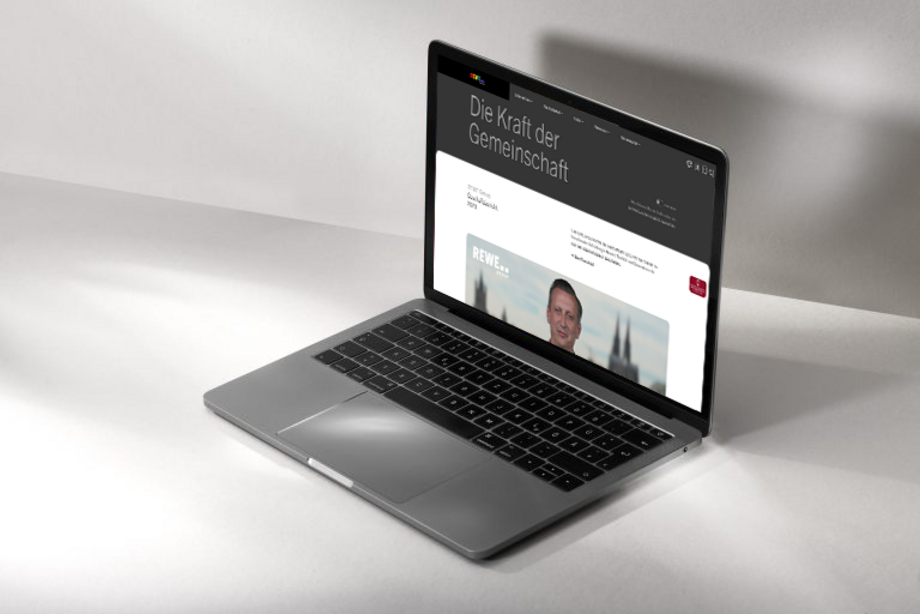 Tackle. Shape. Securing the future. This attitude is part of REWE Group's cooperative DNA and has carried us successfully through the past year. The new 2023 Annual Report is proof of this. In addition to the key economic figures for the business year and the milestones of the year, our CEO Lionel Souque summarises the year in a video foreword.
Tackle. Shape. Securing the future. This attitude is part of REWE Group's cooperative DNA and has carried us successfully through the past year. The new 2023 Annual Report is proof of this. In addition to the key economic figures for the business year and the milestones of the year, our CEO Lionel Souque summarises the year in a video foreword.
Click here for the annual report.


